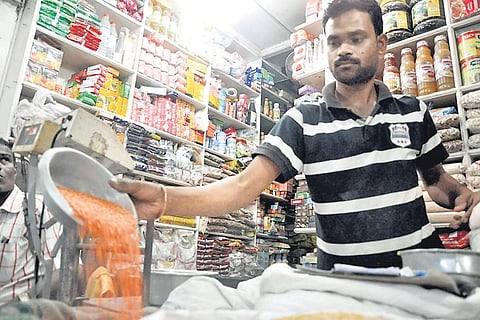

NEW DELHI: Consumer expenditure for essential goods at kirana stores has increased by around 40 per cent since the announcement of the nationwide lockdown, a report by SnapBizz said on Tuesday.
As per the report, there was a major spike in sales in mid-March as an indication of panic buying that took place followed by a low spell till Easter weekend, post which, sales have improved. The study also found a decline in the number of kirana stores operating ever since the lockdown took effect for various reasons.
"There has been a steep increase in sales of essentials in kirana stores. Our data shows that there was a steep increase in sales (by 30 per cent) per consumers from mid-March onwards and further rose by another 30 per cent by end March. But in the past few weeks, we have seen a slight drop in spends per consumer even though it is still high (40 per cent more than usual)," said the report by the Bengaluru-based company which provides new age solutions to convert the neighbourhood retail and grocery stores.
As per the report, the spurt in per person expenditure can be attributed to panic or advanced buying along with the fact that more people staying and cooking at home, thereby pushing up food sales.
Further, the report suggested that more premium products are being pushed by retailers due to availability and more margins, which has also added to the expenditure.
The study analysed over 17 lakh consumer bills recorded in the SnapBizz network of Kirana stores spreads across Delhi NCR, Mumbai, Pune, Ahmedabad, Bangalore, Chennai and Hyderabad.
Prem Kumar, Founder & CEO, SnapBizz said: "With most FMCG sales currently happening out of Kirana stores, these insights go a long way in helping companies understand what is happening with their brands and competition. This data will also help them address supply issues and reassure their distributors, retailers and customers on their continued presence in the market."